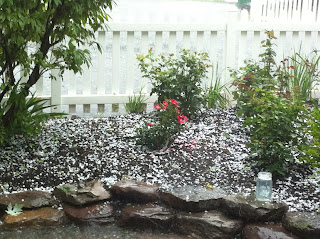Tuesday, August 16, 2011
Garden Report
Wednesday, June 29, 2011
Obsessive Gardening
Tuesday, August 18, 2009
The War of the Flowers

Recently, I blogged on the topic of my new, laid-back approach to dealing with garden pests.
There is one major exception to this tolerant view—the Japanese beetle.
My feud with this voracious plant assassin goes back to the year I first planted roses. My roses looked beautiful until about the Fourth of July, when the mature beetles erupted out of the ground. I’d walk out to the garden to find my flowers covered in beetles. They seemed to have a knack for picking out the most beautiful buds, the loveliest flowers in full-blown glory—and ruining them.
Not only that, those beetles were copulating on my roses, they were coupling up and having sex while they chomped my flowers to bits. They emitted pheromones, calling their comrades to join the fun. Talk about your multi-tasking. Meanwhile, their devilspawn offspring lurked under the turf, grazing on the roots of my grass.
I tried those Japanese beetle traps, and my neighbors thanked me, because they drew all the beetles to MY yard. I crawled around my yard with a teaspoon, seeding it with milky spore to kill the grubs. With no apparent effect. Apparently you have to also convince all your less-obsessive neighbors to crawl around on their lawns, too. Or offer to do the crawling for them.
I tried systemic insect controls, even though I don’t like using pesticides in my garden. The beetles treated it like a condiment. I looked up “Japanese beetle controls” online. Nematodes were described as providing “marginal” control, and the extension service bulletin noted that milky spore “may not be effective in Ohio and Kentucky.” Nobody promised me a beetle-free future.
Anyway, it was fun looking at the pictures of nematodes invading the bodies of Japanese beetle grubs and parasitic fly maggots boring their way into the thoraxes of the adults.
Or consider our friend, the Japanese wasp tiphia vernalis. “The female wasp digs into the soil, paralyzes a beetle grub by stinging, and then deposits an egg on the grub. When the egg hatches, the emerging wasp larva consumes the grub.” HAHAHAHAHA!
I’m not usually like this.
Now that I work at home, I’ve resorted to a marginally effective but completely organic and simple approach. When I take writing breaks, I walk out to the garden, pick off the beetles, and drop them into a jar of soapy water. I don’t know what it is about soapy water that kills them, but it’s fast-acting, whereas a beetle can swim around in a jar of plain water for a couple of days. (Trust me on this.)
Thursday, July 30, 2009
Notes from the Garden: Suburban Menagerie

My Garden in Happier Days
I used to engage in a series of ongoing skirmishes with the animal pests that inhabited my yard.
The trouble began with the rabbits. One summer it seemed like there were rabbits everywhere. I had planted some Icelandic poppies and was eagerly waiting for the buds to open (a one-a-year event). One morning I looked and all the buds had been neatly nipped off.
My husband and I started a rabbit resettlement program (ok, we were young and naïve.) We put a live trap out in the garden and would drive the captured rabbits out to the industrial park and release them. We did this several times.
And then we caught a skunk instead. We retired the live trap and got out of the rabbit relocation business.
My neighbor took a more direct approach when a rabbit ate their newly planted pansies. He went out with an air rifle and shot it. I came home to a dead rabbit in my driveway and his wife and daughter crying, “Murderer!” as he shoveled it into a garbage bag.
I used to use nets to try to keep the birds from eating all our blueberries. Finally, I yanked the bushes and planted roses instead.
I’ve come to view the wildlife that share our yard as a kind of informal, fluid zoo. I realize that I’ve planted my house and garden where animals used to live. Small wonder if they burrow under my deck and raid my bird-feeder.
We have a lively population of chipmunks and squirrels. The chipmunks and moles have a network of tunnels throughout the flowerbeds. Now I sit in the garden and watch as they chase each other around the deck.
There’s a bird feeder outside the window where I write. It’s on a flexible metal pole. I find it entertaining when this big fat squirrel sets it to bouncing and goes flying off . HAHAHA. (It doesn’t take much to distract me when I’m on deadline).

One of the chipmunks took a more direct approach. He found the bag of birdseed in the garage and nipped the corner off, scattering birdseed all over the floor of the garage. No climbing necessary.
Recently, I noticed that the rabbits had nipped all the leaves off my lilies. Hmmm, I thought. Wonder if they’ll survive. The lilies, not the rabbits.
Ducks will lay their eggs anywhere. They are all like, Who you looking at? Earlier this summer, a pair of mallards laid their eggs in the flowerbed next door. The one belonging to Deadeye the bunny killer.
So I’m more laid back as a gardener than I used to be. Or maybe I’ve given up. I’ve accepted the fact that my yard is never going to be a showplace. There are some things that are just not meant to be.
Sunday, May 24, 2009
Notes from the Garden

I’m in the midst of my spring gardening frenzy. I’ve been working in the garden for three straight days. Yesterday I planted flowers—perennials and annuals (begonias, salvia, lavender, lilies, chrysanthemum, and pretty purple spiky flowers I can’t remember the names of.)
Today I shoveled 5 yards of mulch (well, my husband and I did). Now I’m nearly incapacitated. Everything aches, and the skin on my hands feels like it’s going to crack after all the vigorous scrubbing it took to remove the embedded dirt. To make things extra special I’m welcoming my annual case of poison ivy. I never know where it comes from but I get it EVERY YEAR! I practically have to sit on my hands to keep from scratching. That makes it difficult to type.
My ambition always outstrips my stamina. Buy two flats, get one free, well, I’ll just have to find a place to put 24 salmon-pink begonias. Wouldn’t it be great to have a flower border all the way down the driveway? If this bed was wider, I could fit some iris and day lilies in the back. Cutting garden, anyone? Did you know you can buy 100 bulbs for $25 if you order in the spring? (The bulb people know that by fall my enthusiasm and my energy will have waned.) Midway through the flats or the 100 bulbs, I’ll be shaking my head, saying, “Never again!” (Until next year.)
What if I did hard manual labor for a living? What if I had to dig ditches or plow acreage or wrestle boxes around instead of flopping into a chair and hitting the power button? What if I got so dirty on the job every day it required a power washer to get clean? What if I depended on my garden or farm for food (more than a few baskets of tomatoes, peppers and fresh basil).
What if I felt this crappy Every Single Night?
I have the luxury of being a romantic when it comes to gardening. When I was growing up, my grandfather always had a huge vegetable garden behind the garage. A former coal miner and Depression-era survivor, he would plant his onions on St. Patrick’s Day, even though he always said he hated the Irish. Although my grandparents lived in the city, and he worked in a factory, my grandmother canned tomatoes and green beans and peaches and pickles and sauerkraut and they had a cellar full of potatoes and onions.
After my grandmother died, my grandfather remarried and moved away from his garden. “You must be sorry to leave it behind,” I said to him. He looked at me as if I was out of my mind. “I hate gardening,” he said. “I’ve always hated it.”


























